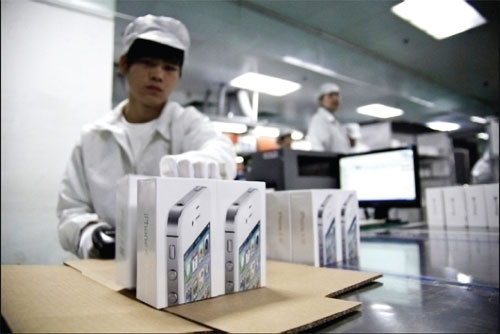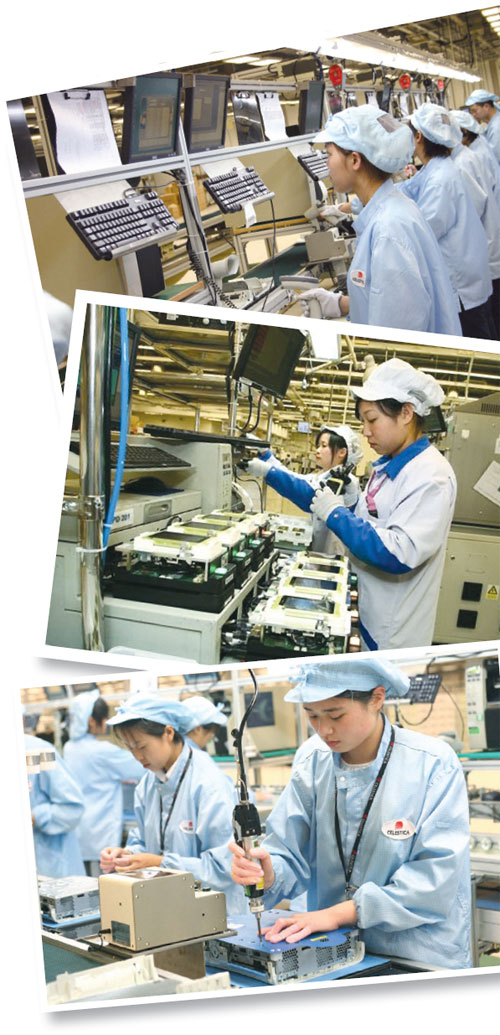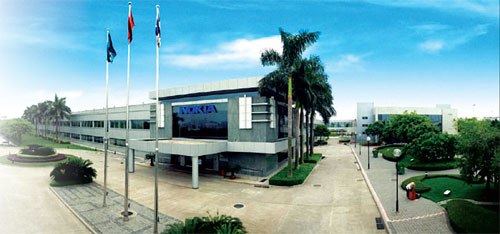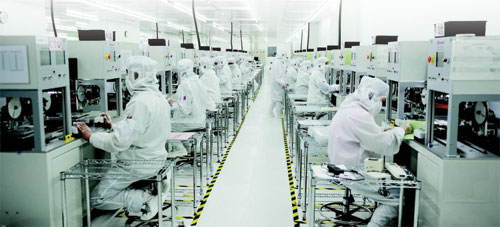Hanging up on Dongguan: Factories struggle for survival
Updated: 2012-09-22 05:56
By Michelle Fei(HK Edition)
|
|||||||
|
Nokia was the first to build a factory in Dongguan in 1995. This move opened the curtain on Dongguan to mainstream mobile phone makers. All photos Provided to China Daily |


Hong Kong mobile phone manufacturers in Dongguan, Guangdong province, where half of the country's mobile phones are produced, are experiencing dramatic fluctuations. Their clients - major phone companies, such as Apple and Samsung - faced with fierce competition are making major changes. While some companies are thriving, many more may not survive. Michelle Fei reports.
To no one's surprise, two days before the latest smart phone, the Apple's iPhone 5, went on sale, people started queuing up in front of the Apple store near Central Park, in New York City.
On the other side of the Northern Hemisphere, Apple's number one rival, Samsung, announced that its most competitive product line Galaxy, will introduce its Galaxy Note II with quad-core processor ahead of schedule. It's expected to hit the market by Chinese Mid-Autumn Day. The fast track release is clearly intended as a countermove against the iPhone 5.
For Shan, a 21-year-old woman who works for a Hong Kong manufacturer in Dongguan, the fierce competition means longer working hours, standing on at assembly line. The company she works for is the major shell maker for Samsung's Galaxy S III and Galaxy Note.
She lifted her own very simple very basic cell phone to call home, to let her family know she'd be working overtime that night.
"We get busier when Samsung sells better and orders more shells. Even though it's busier for us, we feel lucky that our client is doing well in the industry. We know some are doing really badly," said Shan.
"It's much worse for my friend's situation. She works at a factory (producing components) for a less popular brand. They get fewer orders from the phone company. She has nothing to do but to waste time in the factory," said Shan.
The factory where Shan works experienced quite a boom over the last two years, with the orders for shells and related electronic molds from Samsung tripling. Samsung has become her company's major client.
"We've received many more orders from Samsung, and also other smart phone companies in recent years. But the most rapid growth we've seen was with Samsung," said a spokesperson for Hong Kong Chitwin Technology Group Company Limited's factory in Dongguan city.
"We've expanded our factory and improved our productivity to meet the rapidly-growing market demand," said the spokesperson. "Sometimes we even have had to tell our client to cut back on their orders, because we are getting too busy nowadays."
The white-and-blue colored office building of the Chitwin mold factory is situated in the Xin'an Industry Zone in Southern Dongguan city, about an hour's drive from Shenzhen.
Over 600 Hong Kong manufacturers have set up shop in Dongguan. The city has earned a longstanding reputation as "a vital pump along Hong Kong's manufacturing artery" stretching into the Pearl River Delta.

The factories are spread out over a wide array of manufacturing sectors: electrical appliances, electronics, critical components, molding and die-casting, according the Productivity (Dongguan) Consulting Cooperation Limited.
As the "floor of the world's factory", Guangdong province produced a record high 590 million mobile phones in 2011. That's 51.9 percent of the total mobile phone output for the entire country.
Nokia was the first to build a factory in Dongguan. The city was chosen from a dozen cities on the mainland. That was back in 1995. By October 2011, the Nokia factory in Dongguan had produced 800 million cell phones. Nokia's decision, opened the curtain on Dongguan to mainstream mobile phone makers. Apart from Nokia, almost every manufacturer has established major suppliers in Dongguan: Apple, Samsung, Nokia, Blackberry, Google, HTC, Sony, etc.
With the market for smart phones growing rapidly worldwide, the competitive patterns of mainstream mobile brands go through significant changes continuously. Apple and Samsung lead the trend, followed by more "traditional brands" like Nokia, Blackberry, Motorola, HTC, Sony Erikson, Lenovo etc.
"The competitive pattern of smart phone companies has significantly changed in recent years. It's like a snake being led by a huge head (Apple and Samsung), yet with a thin and long tail," said Zeke Ma, senior designer supervisor for Motorola (Beiijng) Mobility Technologies Limited.
The top two brands, Apple and Samsung, with only one to two products respectively, obtained 80 percent of market share for smart phones worldwide, according to Ma, who had been working in the industry for over four years.
Ma used to travel from Beijing to Dongguan from time to time, since Motorola had mobile phone molds manufactured at a Hong Kong factory there.
Now, he has no need to travel there. After Google bought Motorola Mobility on August 15, Motorola took drastic measures to restructure its product line. It was cut back from over 20 to three or four. Over 85 per cent of the company's products were discontinued.
"Motorola stopped all its orders in Dongguan. All of them. Some factories which counted on Motorola could be in big trouble," said Ma.
The major mold suppliers for Motorola were hit hard. One was BYD Company Limited, a listed company on the Hong Kong Stock Exchange. BYD had done well, undertaking innovation and manufacturing work for Motorola.
Making things even worse, Motorola undertook a massive employee layoff in China, especially staff in Research and Development department (R&D). Motorola shut down its office in Nanjing; laid off 40 percent of the staff in its Beijing headquarters, (70 percent from R&D). "Among the top mobile companies, Motorola underwent the biggest changes and also had the most significant impact on its manufacturers," said Ma.
"The trend is smart phones lead the trend. Apple was the best smart phone on the market, so major mobile brands want to go 'Apple-Style' - to learn from Apple's design, working mechanisms, business model, etc," said Ma. "That was bad news for manufacturers in Dongguan."
Key approaches to evaluate the "Apple-Style" were to make sure only domestic staff were involved in R&D. Manufacturing was put out to major overseas suppliers. Like Apple relies on its US-based staff to come up with innovation and contracted five major factories in China, including Foxconn, to make up the rest of its phone.
With Motorola's pulling back all of its research and innovation work to the USA, its Chinese designers, like Ma, will be cut out of the design work. Motorola no longer needs a supplier in Dongguan.
Motorola was not the only brand to take up the trend toward "Apple-Style".
With more major mobile companies going for greater market shares against Apple and Samsung, the wellbeing of Hong Kong manufacturers is closely tied to the ups and downs of the major brands and most of those brands are foreign based.
"If all of the brands go 'Apple-Style', it means small enterprises don't have a chance; technology will never stay in China, which is not good for China's manufacturing industry for the long term," said Ma.
"Business among Hong Kong manufacturers is going to two extremes. Some are doing really well, as they have orders from popular brands; some are struggling and may go bankrupt, because their clients are having a hard time, like Nokia, Motorola etc," said an insider in the manufacturing industry in Dongguan city, who is not permitted to speak on the record.
The person said, after Nokia settled down in Dongguan, many foreign brands followed suit, making it a major manufacting center. The foreign brands left much of the innovation of smart phones to the local manufacturers.
With the industry facing two extremes; the amazing success for Apple and Samsung contractors and near bankruptcy of other contractors, local manufactures can't be dependent on foreign mobile brands any longer, or they will have no control over their own destiny.
"The latest trend was that Hong Kong manufactures started to do business with various brands, more national brands, such as Gionee, Huawei ,Coolpad, etc." said the insider.
The national brand, Coolpad, set up its manufacturing base in Dongguan in 2010, and sold over 10 million mobile phones in 2011. The number is expected to be doubled in 2012, according to spokesperson for Coolpad Li Xuqing.
"Foxconn, the long-time major supplier for Apple, started to take orders from Samsung, and many Dongguan factories started to switch their strategy to national brands. This will help to develop China's own mobile brands and benefit long term development of the manufacturing industry," said the insider.
You may contact the writer through michelle@chinadailyhk.com
|
Manufacturers at Dongguan produce half of the country's mobile phone. |
(HK Edition 09/22/2012 page4)

